French lessons
Posted By Clive Whittingham On 24-10-2014 @ 3:48 pm In Features | Comments Disabled
Factual coproduction may be in decline generally as broadcasters seek more local stories, but there are still opportunities in France if you know how to take advantage of them. Clive Whittingham reports.
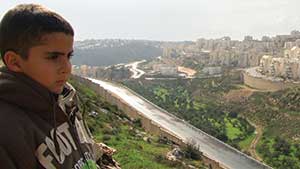
5 Broken Cameras
With broadcast budgets for factual programming being squeezed, and slots increasingly taken up by factual entertainment and returnable reality series, you might expect demand for documentary coproduction to be soaring. After all, it allows more money to be put on screen.
But broadcasters are increasingly turning to local content to create an impact in the genre, making international coproductions tricky.
In France, the annual financial report on the country’s television market, compiled by TV France International and Centre National du Cinéma (CNC), painted a rosy picture for 2013. Sales of French shows abroad had risen 8% to a record €137.1m (US$176.6m) and sales in Europe were up 25.6% at €78.1m.
But coproduction was the one blot on the balance sheet: foreign input in French production through presales was up 8.9% at €42.4m, but copro input was down by 9.2% at €69.4m.
Fabrice Esteve, founder and producer at Paris-based indie Yuzu Productions, says: “In most territories you see broadcasters more focused on local stories because of the pressure of ratings. They have pressure from factual entertainment series and digital channels so they need programmes that immediately speak to the audience. Broadcasters in Germany, France and most markets are more focused on local stories.”
Nevertheless, pairing up with international producers and broadcasters remains the most obvious way of getting ambitious factual projects funded. Louis Vaudeville, head of production at another Paris company, Clarke Costelle & Co (CC&C), teamed up with pubcaster France Télévisions, TV5 in Canada and National Geographic Channels International to get his Apocalypse franchise of colourised First and Second World War docs made. “For big productions now it’s essential to coproduce,” he says.

Fabrice Esteve
France can be a particularly good place to coproduce classic documentaries, because unlike many parts of the English-speaking world, France and the rest of Europe still have broadcast slots for one-offs.
“In most European countries, one-offs are still the rule for coproductions. It’s harder to place series,” says Esteve. “If you look at most pubcasters in Europe – which is the place to go for strands with money for factual programming – they usually only take one-offs.
“A series is usually specific to a broadcaster and a time slot. It’s hard to synchronise the decision-making of several broadcasters on several episodes of something unless it’s a big event.”
France also has Franco-German public channel Arte, which airs 52- or 90-minute one-off documentaries at a time when feature doc slots on mainstream broadcasters around the world are as rare as hen’s teeth.
As well as slots, Arte has money too, contributing €130,000 to €150,000 for a 52-minute documentary or anything up to €230,000 for 90 minutes, according to Karen Michael, commissioning editor at Arte France.
Yuzu coproduced The Electronic Tragedy, about the illegal trade in electronic waste, with Spanish company Media 3.14 and produced versions for Arte, Al Jazeera, RTS in Switzerland, and TVC and TVE in Spain. It also worked on feature doc Free To Run, about the history of long-distance running, with Arte, Point Productions, RTS and Belgian prodcos Eklektik, RTBF and Belgacom.
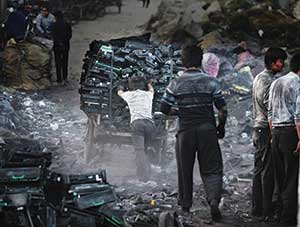
The Electronic Tragedy
“France is privileged in the sense that it has France Télévisions, Arte and the cable and DTT markets growing as well. It can provide a lot of money and, especially with Arte, it’s a place open to international stories,” says Esteve.
That money can also be topped up with funding from the CNC. Christine Camdessus, founder of Paris-based Alegria Productions and former CEO of Gaumont Productions, coproduced Oscar-nominated and Emmy-winning feature doc 5 Broken Cameras, which charted the struggle of a Palestinian village against encroachment from Israel through the eyes of a local land owner.
“The CNC can add between €35,000 and €70,000, depending on a lot of criteria,” Camdessus says. “5 Broken Cameras was the complete example of why you would coproduce with France. The filmmakers, Emad Burnat and Guy Davidi, were already shooting but couldn’t raise enough money to finish the film. We made a deal with France 3 that helped us fund the editing and the post-production.
“They came to Paris and worked with an experienced editor for a summer. We fully financed what they couldn’t: the feature-length and TV versions, different French and Arabic versions, the colour correction and the sound. It took the film from being a local story to an international hit. Being with us for the second part of the system helped them go to Hollywood.”
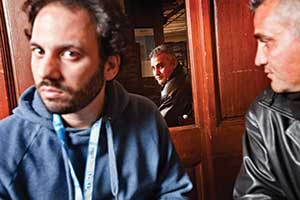
Guy Davidi and Emad Burnad
France 3 committed €80,000 and CNC added €40,000 to the project, which along with presales into French-speaking territories, amounted to 40% of the total budget.
The involvement of France 3 in the project was slightly unusual, as its parent, France Télévisions, is committed by its public service licence to invest mainly in local projects. However, it did demonstrate another broadcast opportunity in France for international filmmakers.
“We have an obligation to invest a certain amount in French productions and that will play a role our decisions on international projects,” says Anna Glogowski, France 3’s commissioning editor for documentaries. “If it’s a French producer it’s better for us as it helps us fulfil our obligation, so we will often ask [foreign] producers to make friends with a French producer. Arte doesn’t have this because it’s a Franco-German channel. We’re obliged to spend €92m in the next three years with the French documentary industry.”
Of course, these pots of money aren’t just being given away. There are rules, and some drawbacks, to coproducing your project in France. Most obviously, CNC requires a foreign producer to team up with a local prodco to access its funds. That has advantages. “If you try to bring a project to Arte yourself it’s 99% certain you’ll take it to the wrong door without help from a local producer who knows the market,” says Esteve.
“To get the full benefit of the French system – a full commission plus the subsidies and the grants – you have to accommodate and ‘become French,’ which can take a little while,” says Camdessus. “To get access to the CNC and qualify you must spend a minimum of 30% of your complete budget on French expenses – documented expenses they can audit, not 30% of a window-dressing budget.”
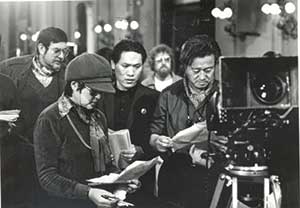
The Lovers & The Despot
Christoph Jörg, CEO of Pumpernickel Films, which is working on Korean War film The Lovers & The Despot for Arte with ZDF in Germany and Tigerlilly Films in Holland, says: “You have to spend money in France and accept a certain number of rules. They’re not crazy rules but we don’t just send cheques out.
“Let’s say you do the post-production and editing in France and you have a French crew, then you have access to money from the CNC. For a 90-minute film, it can add €60,000 to what the broadcaster gives you. You sit with the coproducer and make calculations. It’s either worth spending money in France to get additional money, or it’s not. It depends on the project. I try to build relationships with companies I have worked with in the past.”
Arte is also keen to work with producers it knows and trusts, and will play a hands-on role in funding coproductions, which allows it to help shape the finished article.
“The final cut is with the producer but we get very involved,” says Michael. “It’s huge money and a huge project. We must have this relationship and trust with the producers and then we can fight if we have to fight – because it’s not always a happy story but it means it’s a happy film in the end. If it’s already fully shot we won’t get into coproductions; it would then be a presale or acquisition.”
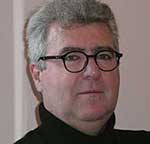
Louis Vaudeville
While Arte’s status as a channel for both France and Germany can be a benefit, with its focus on international stories, it also has a drawback if the coproduction is from prodcos in those two countries.
“Franco-German coproductions are more difficult because of Arte,” says Esteve. “It’s the broadcaster most open to international stories, so when you have a French producer and a German producer it’s likely that both will go to Arte with the project. Arte can only invest in the project once, so as soon as one of the two has Arte it makes life for the other much more complicated.”
Then there’s the thorny issue of versions, with each international channel wanting their own length, focus and language. Vaudeville at CC&C was fortunate that the universal story of the First World War helped him to produce a single version of Apocalypse with different voiceovers for his broadcasters.
“The main issue is always the versioning,” he says. “A good coproduction is when you have only one version, but that’s quite difficult. With Apocalypse we succeeded, but I know from my colleagues in production it’s difficult and sometimes you have to edit a version by country and coproducer. It makes everything hard to manage and takes much longer.”
For Camdessus, the issue with 5 Broken Cameras was its length, with some broadcasters requesting a 55-minute film and others the full 90 minutes.
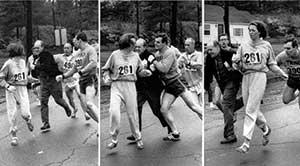
Free To Run
“There are some broadcasters really not willing to play the game when you try to make the same version for everybody,” she says. “Each broadcaster is not fully financing the film so they should respect the fact that, as only one of the partners, they must agree to a version for every broadcaster. But there are some that will tell you no from the very beginning. Then you decide whether you can do a special edit for them for the money they give you.
“It has to be enough money. The editor has to be aware from the start that there will be extra versioning work. If it’s a big film you’ve been working on for three years, the director is exhausted – he doesn’t want to be in the editing room for another day.”
With 5 Broken Cameras, the producers reversed the usual procedure of finishing the 90-minute version and then cutting it back, preferring instead to start with the 52-minute film and then adding in the bits they had been loathe to cut out.
There are other tips for success in coproducing with France. Luc Martin Gousset, president and producer at Point Du Jour International, says: “Do not spend more than you are making on your side – avoid transferring cash from one side to another. You’re coproducing to do better films with a greater margin and better revenues but we have lost money in some markets.”
Point Du Jour has teamed up with Italy’s Graffiti Doc to produce Europe for Sale for Arte in France and Italian pubcaster Rai. The film looks at the practice of selling off national treasures and monuments to settle a country’s debt.
Canada is an obvious destination for French coproductions, not only because of the country’s large French-speaking population but also thanks to a treaty between the two countries that reduces the requirement of 30% French or Canadian spend to 20% when accessing CNC money or other funding and tax breaks.
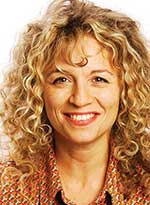
Karen Michael
Despite the close geographical proximity, copros between the UK and France remain rare in factual – unlike drama, where pay TV platforms Canal+ and Sky have partnered on an Anglo-French version of Scandinavian series The Bridge, titled The Tunnel.
“The UK is very UK-focused,” says Vaudeville. “It’s not impossible but I have not had the experience of that. Presales work best with the UK; they are simpler.”
Esteve agrees, saying: “The UK can be a place for European producers but only for a few strands, like BBC Storyville. Apart from that, the UK market is very closed. British television is very specific and competitive. Broadcasters have quotas between the nations and the space for international projects is narrow. The British indies are very good – why on Earth would a British broadcaster take a programme from a producer that doesn’t know its market?”
Feature doc makers can regularly be heard bemoaning the decreasing number of broadcast slots and cash for their projects, as public service broadcasters have been hit by government cuts during the recession. France, with its Arte influence, CNC funding and an undiminishing taste for one-offs over series, could offer a rewarding solution to the problem.
Article printed from C21Media: https://www.c21media.net
URL to article: https://www.c21media.net/french-lessons/
Click here to print.